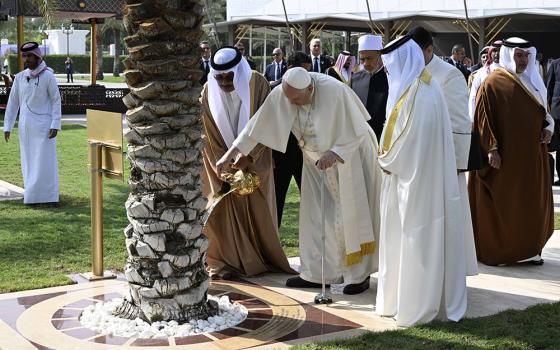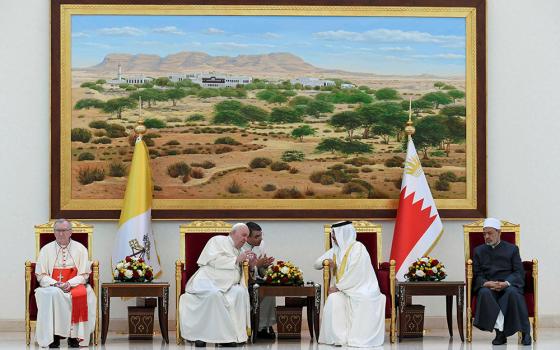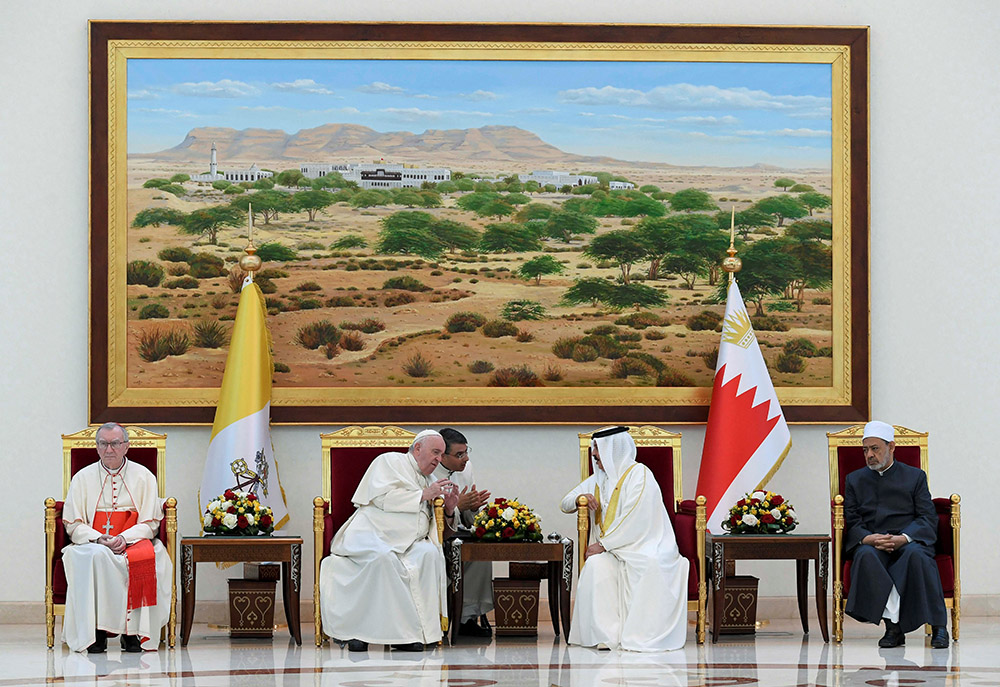
Pope Francis and Bahrain’s King Hamad bin Isa Al Khalifa speak at a farewell ceremony for the pope Nov. 6 at Sakhir air base in Awali. Also pictured is Cardinal Pietro Parolin, Vatican secretary of state, and Sheikh Ahmad el-Tayeb, grand imam of Egypt's Al-Azhar mosque and university. (CNS/Vatican Media via Reuters)
As Pope Francis delivered his first speech in Bahrain on Nov. 3 from the country's opulent royal palace, death row inmate Mohammed Ramadhan sat in Jau Prison, shocked and overcome by what he was hearing.
In that speech, the pope addressed two of the most contentious political issues in the country today: its treatment of prisoners and its practice of capital punishment. "I think in the first place of the right to life, of the need to guarantee that right always, including for those being punished, whose lives should not be taken," Francis said.
His words were a direct challenge to Bahrain's King Hamad bin Isa Al Khalifa, who invited the pope to the country and who ended the kingdom's de facto moratorium on capital punishment in 2017.
Since then, six people have been executed, and Ramadhan is one of 26 prisoners currently facing execution in the country, though the government has repeatedly denied any human rights violations or mistreatment of prisoners. The pope's bold declaration, as he sat onstage next to the king, stunned many of the family members who have long been seeking reprieve for their death row loved ones.
"I was so happy to hear these words," Ramadhan's wife, Zainab Ibrahim, told NCR by phone Nov. 5. "I immediately told my eldest son and he was so, so happy. This is really a moment that gave us hope, gave us joy for our family."
Soon thereafter, Ibrahim received a phone call from her husband, who had heard the pope's speech live while watching BBC Arabic from prison, just 14 miles from where the pope was speaking at Sakhir Palace. Ramadhan told her he was amazed by what he had heard.
Advertisement
For nine years, Ibrahim has lived with the fear that her husband could be executed at any point, following his 2014 arrest for alleged involvement in a bomb blast that killed a police officer.
Ramadhan, a former member of the Bahraini security forces, maintains his innocence and says he, along with another defendant, were tortured into forced confessions. He believes he was politically targeted for participating in peaceful protests following the pro-democracy movements fueled by the events of the Arab Spring in 2011.
An internal Bahraini review of the case also cited medical evidence of torture, and despite his initial guilty verdict being overturned by an appeals court, a high court eventually affirmed the original death sentence.
The handling of the case has attracted the attention and outrage of international human rights organizations.
According to a 2021 report, death sentences in Bahrain have skyrocketed over the last decade by over 600%, following the events of the Arab Spring. Since then, the Sunni Muslim-ruled country has been sharply criticized for its violent suppression and imprisonment of Shiite Muslim protesters — like Ramadhan — though the government has repeatedly denied such charges.
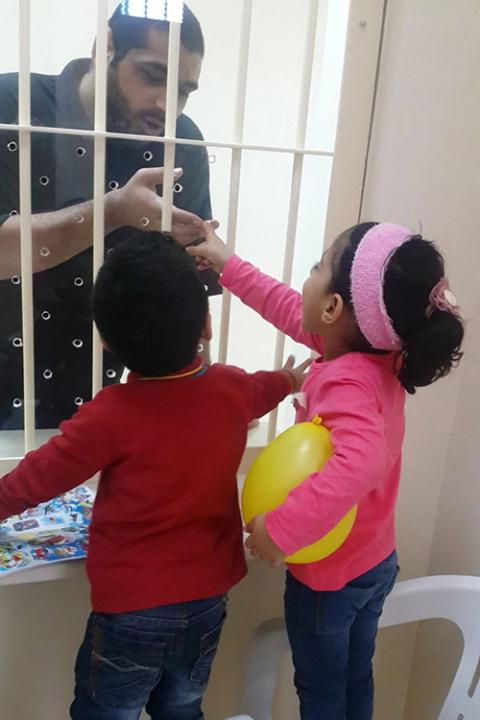
Bahraini death row inmate Mohammed Ramadhan is visited by his children in prison. (Courtesy of Bahrain Institute for Rights and Democracy/Sayed Ahmed AlWadaei)
"There are no words to describe the pain we go through as a family," said Ibrahim, who told NCR that her family is typically able to visit Ramadhan about once a month, though most visits take place through a glass barrier.
"The kids just want to touch the fingertips of their father," she said, of her three children, a 13-year-old and 10-year-old twins.
Ahead of the pope's arrival for his Nov. 3-6 visit to the country, representatives from the London-based Bahrain Institute for Rights and Democracy met with officials from the Vatican embassy in Great Britain to raise awareness of the situation of political prisoners and death row inmates in the kingdom.
The institute also passed along letters from several inmates, directly appealing to the pope to take up their cases with the king, who has the authority to commute sentences or grant pardons.
"Your Holiness, Pope of the Vatican, you believe in spreading love and peace and in the message of Jesus, who always sought to lift the injustice and suffering of the oppressed and the needy who did not find anyone to help them," read Ramadhan's letter, a copy of which was reviewed by NCR.
Sayed Ahmed AlWadaei, director of advocacy for the Bahrain Institute for Rights and Democracy, told NCR that he wasn't expecting Francis to directly address the issue, especially on his first day in the country. The pope's appeal makes him the most high-profile leader to champion the abolition of the death penalty in Bahrain, AlWadaei said.
"This is a really rare moment in our history, to see someone with this authority, sitting in front of the king of Bahrain and directly telling him about the importance of the right to life," he said.
During the pope's four-day visit, Ibrahim also sought, unsuccessfully, to take her case directly to Francis to make an appeal on behalf of her husband.
On Nov. 5, just before Francis arrived to meet with young people here in Bahrain, Ibrahim stood on streets near the meeting venue with other death row inmate families and a sign declaring: "Tolerance and coexistence is a practice not just a slogan."
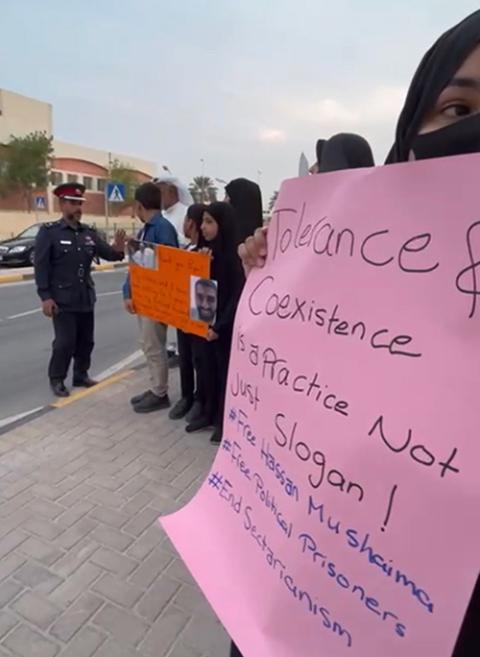
During Pope Francis' visit to Bahrain, Zainab Ibrahim protests the imprisonment and death penalty conviction of her husband, Mohammed Ramadhan, on Nov. 5. (Courtesy of Bahrain Institute for Rights and Democracy/Sayed Ahmed AlWadaei)
Ibrahim and the other protesters were briefly detained by the police before being let go at a nearby shopping mall.
She told NCR that while it was necessary to use the high-profile nature of the pope's visit to make a last-minute case for her husband, "who could be executed any day," sometimes he has faced reprisals against him in prison when a lot of attention has been brought to his case.
Krisanne Vaillancourt Murphy, executive director of U.S.-based Catholic Mobilizing Network against the death penalty, told NCR via email that "even as a small number of nations like Bahrain continue to execute and condemn their citizens to death, most of the world is moving in the other direction. More than 140 countries have rejected the death penalty either in law or in practice."
"Pope Francis' consistent witness against capital punishment is important here," she observed, noting that not only has he echoed Popes John Paul II's and Benedict XVI's opposition to the death penalty, but he "has gone on to clarify the Church's teachings against capital punishment, including with a historic revision to the Catechism in 2018" that it is now considered "legally unnecessary and morally inadmissible."
Ahead of the pope's arrival in the country, a high-ranking Vatican official told journalists on background that he expected the pope to privately ask the king to free some of the country's political prisoners at some point during the visit.
To date, the Vatican has not commented on whether Francis specifically asked for the release of political prisoners or death row minutes.
The pope did meet privately with King Hamad on at least two occasions during his visit, as well as in a private meeting on Nov. 6 with Bahrain's minister of justice just prior to departing the country.
Ibrahim said that regardless of what happens, Francis' stance on capital punishment "will be what people remember" from his time in Bahrain.
During his final public speech in the country on Nov. 6, Francis again returned to the theme of prisoners.
"Caring for prisoners is good for everyone, as a human community," said the pope, "since the way in which these 'least ones' are treated is a measure of the dignity and the hope of a society."





